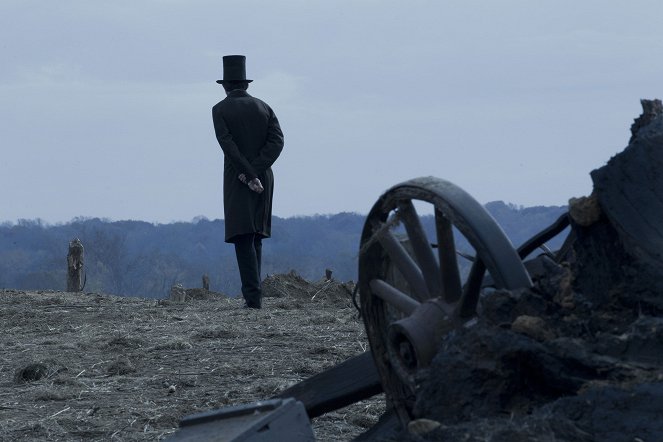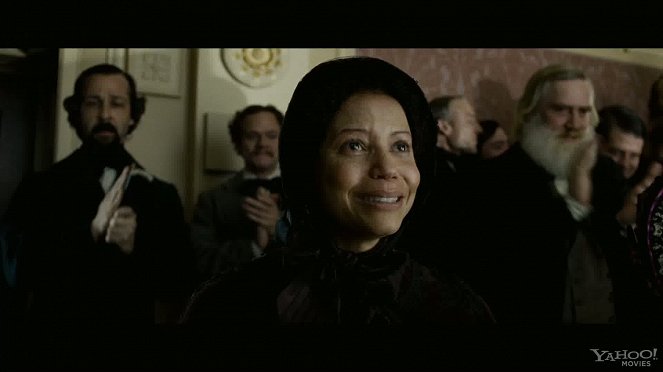Reżyseria:
Steven SpielbergScenariusz:
Tony KushnerZdjęcia:
Janusz KamińskiMuzyka:
John WilliamsObsada:
Daniel Day-Lewis, Sally Field, Joseph Gordon-Levitt, Tommy Lee Jones, John Hawkes, Hal Holbrook, James Spader, Tim Blake Nelson, Bruce McGill (więcej)VOD (3)
Opisy(1)
Ostatnie cztery miesiące życia i prezydentury Abrahama Lincolna to świadectwo jego zaangażowania i pełnej oddania walki z podziałami w narodzie. To ostatnia bitwa, jaką stoczył ten wielki człowiek, mimo ogromnej presji publicznej, trudnych okoliczności i problemów osobistych. "Lincoln" to niezwykły portret jednego z największych liderów Ameryki, który rządził krajem w trudnych czasach niewolnictwa i wojny secesyjnej. Film skupia się na próbie doprowadzenia wojny do końca, ale nie za sprawą faktycznego zakończenia walk, a wprowadzenia trzynastej poprawki znoszącej niewolnictwo i roboty przymusowe. Forsowanie tego dokumentu wymagało ogromnej odwagi. Człowiek, który podjął się tej walki został legendą. Zmienił oblicze narodu, ale i świata. Dążył nie tylko do tego, by pogodzić zwaśnionych Amerykanów, ale i przekonać politycznych przeciwników do racji, w które wierzył całym sercem i o które walczył dla dobra ludzkości. (Imperial Cinepix)
(więcej)Materiały wideo (56)
Recenzje (14)
Griffith, Ford, Spielberg. Lincoln. Three great American directors and their respective versions of the Lincoln myth. Though Spielberg takes an honest and respectful approach to Lincoln’s personality, creating a cult and idealising a democratic idea is not as important to him as drawing the viewer into the narrative. Above all, this is a riveting political drama, with Abraham Lincoln as the protagonist. It is fascinating to watch how smoothly one of Spielberg’s least action-oriented and least epic films moves forward, how the individual scenes are knitted together, how the director works with the deadline (to get 20 votes by the end of January), how the personal storyline serves the work storyline. The film does not primarily set out to depict Lincoln as a messianic figure demonstrating helpfulness toward all human beings without distinction, and such deification, if it happens, never overshadows the central goal of pushing through the Thirteenth Amendment before the end of the Civil War. We may even have doubts about the “purity” of Lincoln’s relentless pursuit of justice in the face of the law – we are not led to adopt a clear position as actively as in Spielberg’s other socio-political films, e.g. through impassioned music. Furthermore, the narrative is slowed the most by Lincoln’s “Christ-like” tendency to sit down in front of a group of listeners and start telling them a story. Does this really prove to us that Lincoln is the father of the American nation, who could take the liberty of making jokes about George Washington, or have we entered the realm of political satire about an elderly gentleman who liked to talk at times when it was necessary to act? The father interpretation would clearly be more appropriate also for the repeated adoption of the younger son’s childish perspective (including a very clever narrative feint in the climax), but to me it particularly involved the highlighting of the lack of didacticism in Spielberg’s approach. With the flawlessly cast actors and very impressive images (the meaning-making lighting and placement of the characters, frontal shooting, when there is a reason for every movement), With Lincoln, Spielberg primarily constructed an intelligent drama that ceaselessly keeps us on our toes and requires constant linking of contexts. And only then did he create a myth. 90%
()
In some ways, Lincoln uncomfortably reminded me of last year's sensational The Help. Probably due to the film’s ostentatious clinging to the fact that black and white, truth and falsehood have no shades. Spielberg made a film that reminded me of Eliad's concept of an absolute epic time. It is not a historical drama. It's a myth. A myth in which politicians disintegrate into enlightened progressivists, hysterical obscurantists and spineless "hesitators". A myth in which we do not ask what motivates the main character to such a determined attitude, what drives him forward, because the main character himself is the absolute truth (although it suggests a certain internal ruggedness in the film, the film never lets it prevail and disrupt the state aura). Lincoln could not have wished for a better form than Daniel Day Lewis imprinted on him - slow, deliberate, genial, infinitely kind, yet convinced and convincing to the bone. Spielberg treats the character with striking iconicity - the way he places him in the shots, the way he uses the meaning-creating light, only confirms to us that Lincoln the mortal is not in front of us, but rather Lincoln the icon. When the president dies, Steven draws a baroque shot in which life is darkness and death is light ("He has gone to Eternity"). The Hagiography of the Saint, including the structure of the narrative - an exposition revealing the world in imbalance / enlightenment through dream / rectification / martyrdom (something that has worked well since the Middle Ages, through messianism, to this day). I'm not making fun of it, I’m not questioning it. I've seen other deified lumens with a far greater degree of dilettantism, and it does not bother me in Lincoln. But it also doesn't affect me in any way. This is a film-ritual for believers, whether "Lincoln" or "Spielberg" lovers, who will compete in praising how narratively and formally brilliant it is (and it indeed is). I do not deny the film the visual captivation of classical art, nor the narrative prowess with which Spielberg brings humor to the leather framework of parliamentary debates and skillfully alternates spatial-temporal plans. But the film is cold, simplistic in some respects, avoiding real problems... I have to smile a little: when Lincoln bribes the Democrats to help him out, we can agree that he's doing the right thing (because he represents the truth, "it's a long time ago", and moreover it's filmed as a comedy). But when the protagonist of The Ides of March does the same thing, it's disgusting pragmatism, dirt, disgusting politics, and American critics are writing about a film that today's America doesn't need. Today's America certainly needs Lincoln and a solid granite myth. As a spectator, I don't need to see anything like this, even if it has a more self-virtuoso form. It is, in my view, self-affirming ideological boredom that defends any doubts by eradicating them with the schemes seen a hundred times, to which the elite actors' faces and the proven structure of the narrative give the impression of uniqueness. But such a film is not able to offer me anything important for life, just a yawning abyss of distance from the perfectly coherent and closed world of myth. With all due respect, Mr. Spielberg.
()
(mniej)
(więcej)
Not enough of Janusz Kamiński’s impressive exterior shots (two, to be exact: Joseph Gordon-Levitt watching body parts being covered with soil and the pair sitting on the porch). Too few emotional scenes in which John Williams could show off. Too few
relationship storylines that would increase interest in the characters and their fates. Too little of anything that would
intrigue viewers who are not interested in these particular historical events. Elegantly filmed and well-played interior
history tedium. Daniel Day-Lewis is excellent as always.
()
People will expect from this movie whatever they will. It was made by Spielberg, so in this respect there is nothing wrong with it, more or less. Daniel Day-Lewis in turn trained god knows how many years for this character. Everybody keeps saying that he articulates like Abraham, but nobody has really seen him alive. But yeah, I get it. But I’d say that such a movie only makes sense for the USA. Over here, it’s average at best and it’s impossible to have any deep emotions about it. Quite the contrary. I only watched it because of Spielberg and it was a waste of time.
()
So what, guys, shall we abolish slavery? Yay or Nay? Lincoln watches broodingly. The lawmakers negotiate. Lincoln speaks broodingly. The lawmakers debate. Lincoln remains broodingly silent. The lawmakers argue. Lincoln dictates a letter, broodingly. The lawmakers vote. Lincoln broodingly leaves the room. The lawmakers celebrate. Lincoln dies, this time without a sign of broodiness. I’ll say this, for the target audience of historical conversational biopics (the film shows a battlefield only once, and right at the beginning), this film about the famous American president and the process of approval of the 13th constitutional amendment will probably be perfect. Spielberg is a master of his craft, Daniel Day-Lewis is a master of his art, and both of them show it. But honestly, who among us (with the exception perhaps of art scholars) can be interested in this? In short, a likely bland Oscar winner that I will not like. But I have to give it to it that it never pissed me off the way Spielberg’s previous film did. PS: And I looked forward all the time at least to the assassination… but nothing. PS2: Steven, please, do Robocalypse next.
()
Galeria (70)
Photo © Twentieth Century Fox Film Corporation / David James


